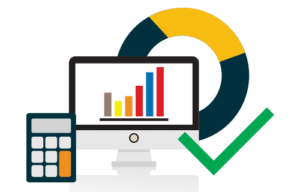How Does Non-Profit Debt Consolidation Work?
See if debt consolidation from a non-profit organization is right for you.
For those individuals struggling with large amounts of unsecured credit card debt, non-profit debt consolidation can represent a viable path out toward a better financial future. A good non-profit debt consolidation/credit counseling firm will offer an introductory 45-90 minute telephone counseling session to a prospective client during which all aspects of the individual’s financial situation are discussed.

Following this initial counseling session, a debt management plan (DMP) will often be implemented, resulting in one combined lower monthly payment that is made to the non-profit debt consolidation agency who then disburses appropriate amounts monthly to the individual’s creditors.
There are numerous benefits to this process – including lower interest rates and expense, along with the simplicity of making one single monthly payment, as opposed to the arduous task of managing multiple monthly payments to multiple creditors.
But perhaps the greatest benefit of all is that a good non-profit debt consolidation firm can place a debt saddled individual back on the road toward financial wellness with a carefully planned payment schedule that can be met over a period of three to five years. Let’s take a closer look at how non-profit debt consolidation works in practice.
How Do I Find a Good Non-Profit Credit Counseling Agency?
The Federal Trade Commission (FTC) recommends working with a non-profit credit counseling agency staffed with certified debt counselors who can help develop a budget and debt management plan for you following an interview. Visit the Better Business Bureau at www.bbb.org to investigate the track record of the counseling agency, and be sure to verify that there is not a long list of outstanding complaints against the agency and that it is properly licensed.
There should be no hidden fees, and you should avoid any counseling agency that attempts to charge upfront fees – including an application fee, “membership” fee, or any per-creditor fees. You should, however, expect to pay regular monthly fees of approximately $25-50 to your counseling agency for the services they provide related to a DMP.
ABC
Should I Enroll In a Debt Management Plan?
A reputable credit counselor will make recommendations for you related to controlling your expenses and enhancing income while also offering free educational materials that can further get you on the right track financially. After evaluating your situation, the counselor may offer you a DMP that would include a reduction of interest rates and monthly payments on your unsecured debt, subject to the acceptance of your creditors.
If you agree to enroll, the duration of the payment schedule will generally be between 36 and 60 months, so this is a process that requires a commitment to getting out of debt for it to truly work.
Once enrolled in a DMP, all of your credit card accounts will be closed (with the possible exception of an “emergency” credit card remaining open) and you will be unable to obtain new credit. The closing of accounts will have an initial negative effect on your credit score, though creditors view enrollment in a DMP as a positive development for your credit profile, as your enrollment indicates a willingness to pay your debts.
Be aware that it is a bad idea to pursue new credit while enrolled in a DMP, as creditors will become aware of any applications for new credit by simply viewing your credit report. This can result in creditors rescinding interest rate and payment concessions that were put into place through implementation of the DMP. Just focus on making regular timely payments to your counseling agency and this will ensure the success of your DMP.
Look For the NFCC Affiliation
Unfortunately, the debt relief industry includes more than its fair share of unscrupulous organizations who won’t think twice about taking advantage of an already financially burdened individual who is merely seeking help and a workable way out of a difficult situation. Scam artists abound who will push inappropriate forms of debt relief while charging unnecessary fees in an effort to boost the bottom-lines of their own for-profit operations.
Therefore, in order to make certain that you work with a good non-profit counseling agency, it helps to look for an NFCC accredited non-profit debt consolidation agency. NFCC stands for the National Foundation of Credit Counseling, an organization founded in 1951 and the nation’s largest and longest serving non-profit financial counseling organization.
NFCC member agencies provide financial counseling services to over a million consumers each year while pursuing its mission of financially responsible behavior on a national level while delivering high quality financial education and counseling services.

Are you in debt? we can help
Get Debt Relief
Speak with licensed debt specialists dedicated to guiding you toward financial stability every step of the way.

Ready To Get Started?
See if you qualify for debt relief. Get a Free savings estimate to see how quickly you can be debt free.
Embrace financial freedom with our tailored solutions, expert guidance, and unwavering commitment to your success.
Experienced Professionals
Our experienced team has helped thousands of clients successfully eliminate debt and regain financial freedom.
Customized Solutions
We know every financial situation is different, so we design personalized debt relief plans to fit your specific needs and goals.
High Success Rate
Our proven debt relief strategies deliver real results. With a strong track record of success, we help clients achieve lasting financial stability.
Confidential Consultation
Your privacy is our priority. All debt relief consultations are 100% confidential and handled with the highest level of discretion.
Explore other blogs











